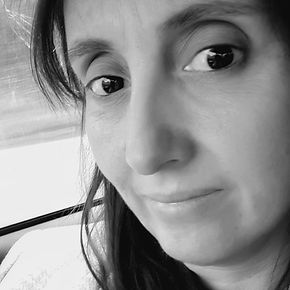Emma Page
the poet
Emma Page was born in Yorkshire and has lived in south-east London for the past eighteen years. She's a former English teacher who now works as a writer, tutor and coach – and as a mother to two boys. Her poetry has appeared in Poetry London, The Best British Poetry 2011 and the online journal Berfrois. She's currently working on a novel for children, and towards her first pamphlet of poetry.
the poems
I Draw a Map
of Where We're Going
I draw a map of where we’re going.
It seems that all our pens have come from hotel chains
or medical reps. This one is called chlamydia.
We stop to buy flowers – sea-holly
and tulips – and a coffee. Good luck with
your move we’ll say –
then we wait too far
along the platform and are forced
to make a run for it again.
(We’d been naming the trains,
and I’d been checking out the latest deeds
of the guerilla gardeners.)
Some lines have newer rolling stock,
and a more reticent smell, unlike this carriage
with its warm, worn fibres.
The train is packed and no one travels light:
a briefcase, rucksacks, violin case, nappy bags.
We’re not the only buggy.
I am reading you facts about hagfish:
eel-like, jawless, squirt slime when they’re scared,
and an old man is swearing at this couple.
What a slime eel I think, sipping my coffee
so I try to catch the woman’s eye and smile. Just then
the old man takes from his beaten-up
duffel-bag a kitchen knife. Someone –
I wonder who – pulls the emergency cord,
and the armed man’s sincerity
when the train stops
as he mutters about why we’re being held up
is almost touching.
Two days later
from a café, I look out at a
metal-grey sea. Above me
portraits acting louche
while another shuts her eyes,
and a customer pronounces
on a poem, how it gets to him on every read
right between the ribs. Cutlery ripples
on mismatched china like applause.
He smiles and says to his companion
I’ve been threatening to give them a recital
for I don’t know how long.
Poem in Which
the Ink Runs Out
Halfway through printing, magenta and black run low.
This transfusion is easy. So much is apt for these dark times.
Stepping over the post on the doormat – your vote today matters –
I saw more than you’d allow: the good-as-useless stairs, the state
of the kitchen, and in that kitchen, for the last time in eighty years,
you: blown glass ribcage, goldfinch-light, bloodless.
There’s no such thing
as a peaceful transfer of power,
but the ghosts of all your cats and dogs were there;
your unloved garden’s birds, the uneaten in their thousands,
and the pint-glass spiders, and the flies you would not swat,
the fleas in the fur, every stray, and all their offspring
lined up as a mark of respect, and their eulogies
did not stop when the builders came.
The Tapers
He entered the hallway
in needles, touched up paintwork
with strokes, darned the holes in my skin.
Even the under-the-floorboard spaces basked
in his rays, misers for a hoard that won’t be kept.
The street’s fanlights and keyholes drank him in
and when he left they thirsted for him.
Now shadows come. I shut the blinds.
The dust motes lose their spotlight.
I put away the tapers.
.png)




